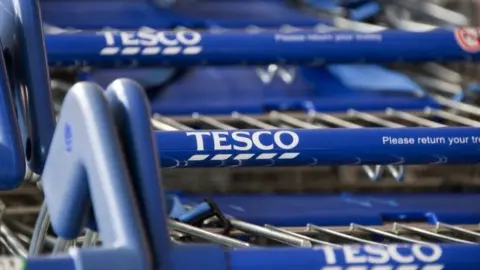Tesco-Booker deal to face in-depth competition probe
 EPA
EPAThe proposed purchase by supermarket giant Tesco of wholesaler Booker is to be subjected to an in-depth probe, UK competition authorities have said.
The Competition and Markets Authority (CMA) says there are concerns over the proposed £3.7bn tie-up.
The CMA said there are 350 areas where there is an overlap between Tesco shops and Booker-supplied independent stores.
It said the deal could be bad for shoppers in those areas because of reduced competition.
The CMA said that if the deal were to go through, potentially, Booker could offer inferior wholesale terms to the stores it currently supplies, "in order to drive customers to their local Tesco".
Last month, Tesco and Booker asked the UK competition regulator to fast-track its investigation of their proposed £3.7bn tie-up, from a basic Phase 1 investigation to a more in-depth Phase 2 inquiry, which has now been confirmed.
The CMA added that other competition concerns had been "raised and considered" during its initial Phase 1 investigation, and would be given greater attention in Phase 2.
The statutory timetable for the in-depth Phase 2 investigation is 24 weeks, which means the final report will be published before Christmas.
Store brands
The fast-track process has been used in a number of CMA merger investigations previously, including that of telecoms firms BT-EE, as well as during the tie-up of bookmaking firms Ladbrokes and Coral.
Booker is the UK's largest food wholesaler and also owns the Premier, Budgens and Londis store brands.
Despite rising competition from the likes of Aldi and Lidl, Tesco remains Britain's biggest supermarket.
The CMA could force Tesco to sell stores if it believes the deal will harm competition within the industry.
When the takeover was announced, Tesco and Booker said they did not expect it to be completed until late 2017 or early 2018, suggesting both companies expected this closer scrutiny from the watchdog.
In March, one of Tesco's biggest investors, Schroders, warned about the cost of the deal, telling the BBC that the supermarket giant was paying a "premium" and it had "major concerns" about the deal.
